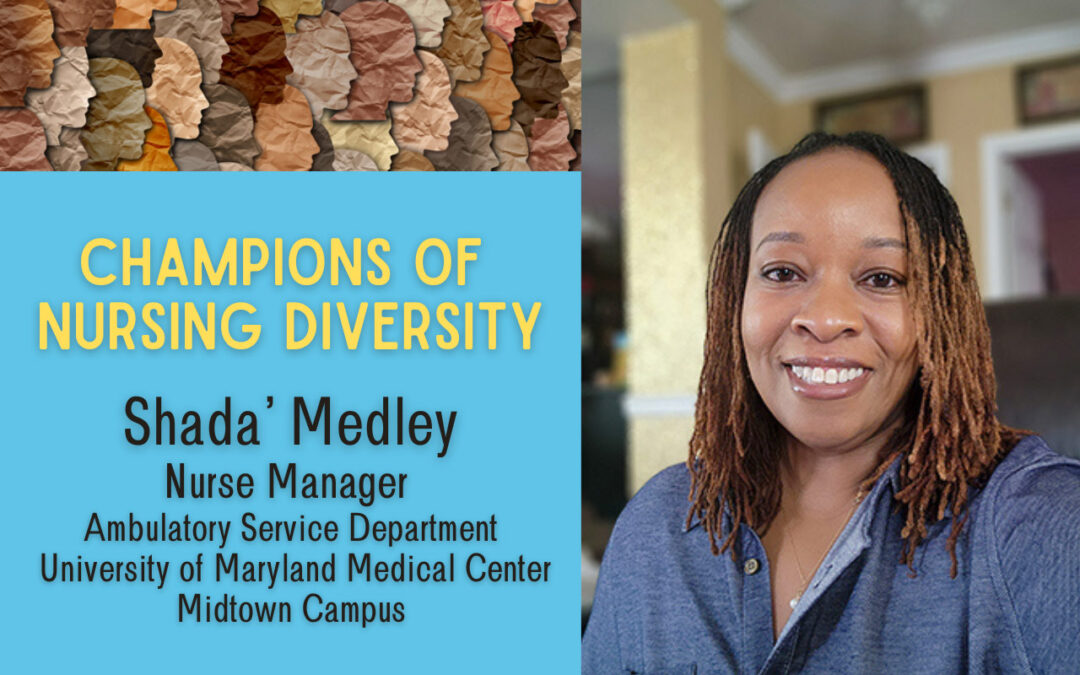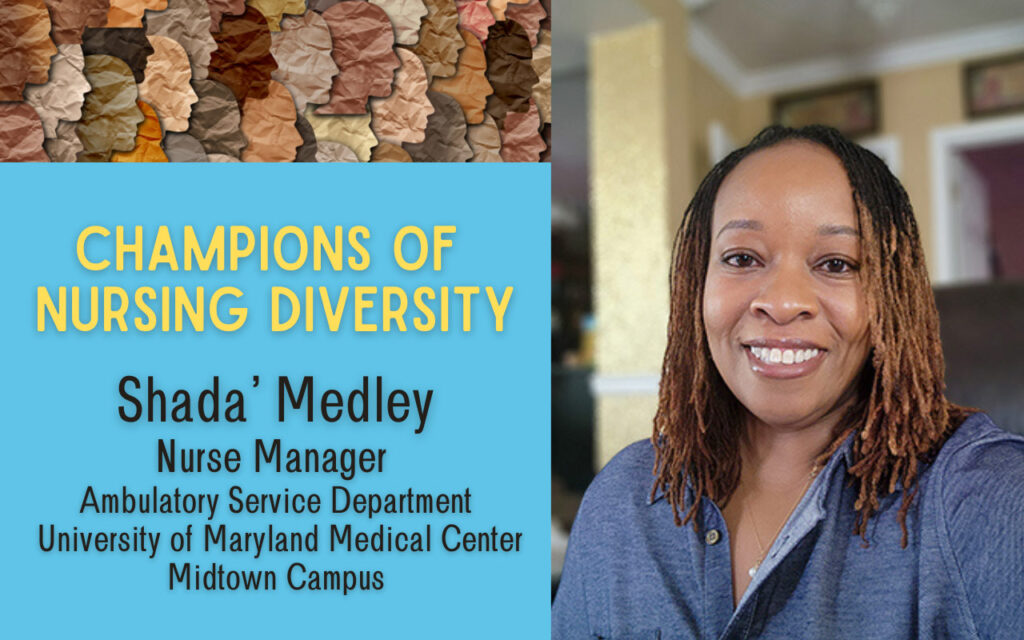Shada’ Medley joined the University of Maryland Medical Systems to be a change agent for innovative nursing care with a more diverse population.
Medley says her career path is part of God’s plan and cites Denzel Washington and Oprah Winfrey as a source of inspiration.
Shada’ Medley is an important nursing leader, and we’re pleased to profile her as part of the Champions of Nursing Diversity Series 2023.
The series highlights healthcare leaders who are prominent figures in their organizations and are making transformational impacts in nursing.
Meet Shada’ Medley, MSN RN, nurse manager in the Ambulatory Service Department. She manages the THRIVE program clinic, known as infectious disease, at the University of Maryland Medical Center Midtown Campus.
How long have you worked in the nursing field?
I have been an RN for 20 years and a medical assistant for five years prior.
Please talk about your career path and how you ascended to that role.
I feel that it was in God’s plan. I started as a MA and had a 5-year plan to be a nurse (5 years is how long the MA/phlebotomy certification lasted). I met my goal. However, just as I was ready to enroll in nursing school, I realized that I could not afford my livelihood and attempted to withdraw. As I withdrew from the day program, CCBC initiated its first evening/ weekend program (God’s blessing). I enrolled in that program and completed it on time as scheduled within five years. My next goal was BSN, so I enrolled in the first nursing partnership cohort with Notre Dame. With the same partnership, CCBC recruited faculty from within the hospital where I was employed. I then duplicated the same situation for MSN.
At the MSN level, l concentrated on nursing education. I started healthcare in ambulatory care as MA. I entered a nursing role in critical care for 14 years. Then, I transitioned to outpatient ambulatory care as an interventional radiology nurse. While working towards my MSN, my current leader transitioned to a more corporate role and inquired how I felt about management. I never thought about management, just education. I am a product of teenage parents. I remember holding flash cards for my mom. I remember organizing my mom’s books. I remember when my mom told me about tutoring adults that couldn’t read and how important it was not to be judgmental. My manager had been teaching and guiding me to function in her absence, and I also attempted to do that with my team. I remember thinking, why would I allow someone new to take over a role I already know I can progress? So I applied for that position and was hired. I branched off to skilled nursing and went from manager to ADON within a year and DON within two years. After skilled nursing, I felt I needed to help patients never reach long-term care or intensive care units. I then returned to ambulatory care with a focus on the PCMH model. I came to UMMS to be a part of a larger organization that would allow me to flourish and be a change agent for innovative nursing care with a more diverse population.
Why did you become a nurse?
I have always been able to put the needs of others before my own. I have always enjoyed the satisfaction of taking care of others. I became a nurse to help, care for others, and give back to society.
What are the most important attributes of today’s nursing leaders?
The essential attributes are empathy, diversity, equity, and inclusion. Even if it is not your belief, seeing someone’s point of view opens doors for communication, which is always good. Proper communication leads to innovation within the healthcare system.
What does being a nursing leader mean to you, and how are you making a difference?
Being a nursing leader means someone who inspires passion and motivation in others to believe in advancement and forward movement. A leader ensures their team has the support and tools to achieve their goals professionally and personally and to advocate for professional advancement.
What is the most significant challenge facing nursing today?
Access to diverse, equitable healthcare and the lack of available nursing educators.
As a nursing leader, how are you working to overcome this challenge?
Making short- and long-term goals include maximizing my education to obtain DNP and assuring work-life balance. Also, to actively and continually participate in the academia of licensed and unlicensed healthcare professionals. Also, by encouraging others to set goals for advancement in healthcare.
What nursing leader inspires you the most and why?
I am inspired by all nursing leaders who can lead the profession with their hearts first by balancing equitable patient care and cost-effective care. The nursing leader who truly empathizes with the population’s needs. The nursing leader who supports diversity, equity, and inclusion as a framework in their leadership style. Most of all, I am inspired by the leader who understands they are only as good as their team.
What inspirational message would you like to share with the next generation of nurses?
Denzel Washington said, “Ease is a greater threat to progress than hardship.” Everything worth having is worth working for… sometimes our circumstances should be our motivation.
Is there anything else you’d like to share with our readers?
As Oprah powerfully stated, “No matter where you are on your journey, that’s exactly where you need to be. The next road is always ahead.” So be kind to yourself and know that you can do it!
- Meet a Champion of Nursing Diversity: Kendra Coles - April 3, 2024
- Meet a Champion of Nursing Diversity: Barbara Bosah - March 13, 2024
- Tune Into New Podcast Series: Conversations About Health Care Delivery in the United States - March 7, 2024




